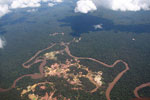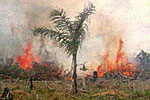FEATURED ARTICLES [Latest news updates]
Photos from Suriname
(05/30/2008) Earlier this month I visited Suriname, reporting from the annual meeting of the Association for Tropical Biology and Conservation and spending some time in the forests of the Guiana Shield-Amazon. Pictures from the trip have been added to the photo section of the site.
[
Suriname]
An interview with Van Jones
"The green movement has to become a rainbow-colored movement
in order to be successful"
(06/23/2008) Van Jones, a social and environmental activist, believes a greener economy not only could save the planet, but also must provide pathways out of poverty for America's disadvantaged communities. A civil rights lawyer from Yale University, Jones started promoting the idea of "green-collar jobs" in 2005 through the Ella Baker Center for Human Rights in Oakland, California. In September 2007, he launched the "Green for All" campaign. Jones recently took time to share his perspectives with Mongabay.com.
[
Interviews | Featured | Green business]
Scientists call for mining ban, new protected areas in Suriname
(06/21/2008) In a declaration set forth at their annual meeting in Paramaribo, Suriname, the largest group of tropical biologists called upon the Surinamese government to evict informal gold miners from three ecologically important areas in the South American country. Miners have been blamed for a number of environmental problems including over-hunting of wildlife, deforestation and destruction of riparian habitats, erosion, and mercury pollution in waterways.
[
Mining | Suriname]
Global Commodities Boom Fuels New Assault on Amazon [external]
(06/20/2008) Appearing on Yale's new environment 360 site: With soaring prices for agricultural goods and new demand for biofuels, the clearing of the world's largest rain forest has accelerated dramatically. Unless forceful measures are taken, half of the Brazilian Amazon could be cut, burned or dried out within 20 years.
[
Amazon | Brazil | Deforestation]
Does logging contribute to AIDS deaths in Africa?

|
|
(06/12/2008) Logging activities in tropical Africa may pose hidden health risks to wildlife and humans according to a veterinary pathobiologist speaking at a scientific conference in Paramaribo, Suriname. Thomas R. Gillespie, a researcher at the University of Illinois at Urbana-Champaign, said that primates living in logged and degraded forests in Uganda and Republic of Congo have higher incidence of potential pathogens relative to their counterparts found in undisturbed areas. The findings have implications for human health in that some of these disease agents dramatically increase mortality of people suffering from HIV/AIDS. Since the study areas have high HIV/AIDS infection rates, an increase in the abundance of these disease agents could have significant health impacts.
[
Health | Primates | Africa | Logging]
Colombia creates rainforest reserve to protect medicinal plants
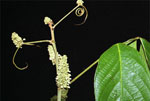
|
|
(06/12/2008) Colombia today announced the creation of a rainforest reserve dedicated to the protection of medicinal plants. The Orito Ingi-Ande Medicinal Flora Sanctuary encompasses 10,626 hectares of biologically-rich tropical rainforest ranging in altitude from 700 to 3300 meters above sea level. The sanctuary is based on an initiative launched by local indigenous communities with the support of the Amazon Conservation Team (ACT), an innovative NGO working with native peoples to conserve biodiversity, health, and culture in South American rainforests. Members of the communities — which include the Kofán, Inga, Siona, Kamtsá, and Coreguaje tribes — combined their rich knowledge of medicinal plants with cutting-edge technology to determine the placement and extent of the reserve.
[
Biodiversity | Conservation | Colombia | Indigenous people | Happy-Upbeat Environmental]
Madagascar signs big carbon deal to fund rainforest conservation
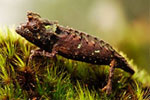
|
|
(06/11/2008) Madagascar will sell more than nine million tons of carbon offsets to fund rainforest conservation in a newly established protected area. Conservationists say the deal will protect endangered wildlife, promote sustainable development to improve the economic well-being of people living in and around the park area, and help fight global warming.
[
Madagascar | Avoided deforestation]
Charcoal signatures: Heavily-populated Amazon was decimated by old world disease
China's economic growth may be helping panda habitat recovery
(06/11/2008) Rapid economic growth may be helping the recovery of key panda habitat in Wolong Nature Reserve in China, said a researcher speaking at a meeting of conservation biologists in Paramaribo, Suriname.
[
China]
Guiana Shield forests help preserve biodiversity and climate

|
|
(06/09/2008) The Guiana Shield region of South America could play a significant role in efforts to fight global warming as part of a broader strategy to protect the world's biodiversity hotspots and high biodiversity wilderness areas, said a leading conservationist speaking in Paramaribo, Suriname at a gathering of tropical biologists.
[
Carbon finance | Avoided deforestation | Suriname | Rainforests]
Dried-up Colorado takes toll on giant Mexican fish

|
|
(06/08/2008) The Colorado River vanishes before it reaches the Sea of Cortez in all but the wettest years. Companies in California and the southwestern U.S. have diverted its once-vibrant flow to quench their thirst for water and power. Now, a new study in the April 2008 issue of the journal Biological Conservation reports that the dwindling of this major artery has changed the way some marine fish in the Gulf of California grow and develop.
[
Fish | Dams | Mexico]
Elephants may explain Mount Kilimanjaro's bamboo enigma

|
|
(06/25/2008) At nearly 6,000 meters in height, Mount Kilimanjaro is both Africa's tallest mountain and the world's highest solitary peak, home to a diverse range of habitats that support a large variety of plant species. Yet, unlike any other mountain in Africa, Mount Kilimanjaro contains no bamboo. Scientists have pondered Mount Kilimanjaro's missing bamboo for over a century. Some have come to the conclusion that it is a result of dry conditions, but Dr. Andreas Hemp believes he has found another explanation. Speaking at the annual meeting of the Association for Tropical Biology and Conservation (ATBC) in Paramaribo, Suriname, Hemp said that Mount Kilimanjaro had similar rainfall to other tall East African mountains and that the mystery of the missing bamboo is due to a long interplay between elephant and human populations.
[
Ecology | Elephants]
Photos from Utah
(06/25/2008) Last month I visited Bryce and Zion in Utah. Pictures from the trip have been added to the photo section of the site.
[
Utah]
Britain, Norway commit $210 million towards Congo rainforest conservation
(06/24/2008) The governments of Britain and Norway last week announced a $211 million (£108 million) initiative to conserve rainforests in the Congo Basin. The plan calls for the use of an advanced satellite camera to monitor deforestation in the region and funding for community-based conservation projects.
[
Carbon finance | Congo]
Biofuel production on abandoned lands could meet 20% of global oil demand
(06/23/2008) Using abandoned agricultural lands for biofuel production will meet only a small fraction of global energy needs without compromising food supplies or diminishing biologically-rich habitats, reports a new study published in the journal Environmental Science and Technology.
[
Biofuels]
Amazon soy moratorium extended; may be expanded to other products
(06/23/2008) Soy crushers operating in the Brazilian Amazon have extended a two-year-old moratorium on the purchase of soybeans produced on rainforest lands deforested after 2006, reports Reuters.
[
Amazon soy]
U.S. may allow corn farming on conservation land
(06/23/2008) The U.S. Department of Agriculture may allow farmers to plant corn on million of acres of conservation land to bolster the food supply in response to flooding in the Midwest and record high prices spurred by demand for domestic ethanol production, according to a report in the New York Times.
[
Ethanol]
MPG misrepresents gains in fuel efficiency from scrapping worst gas-guzzlers
(06/20/2008) The use of miles-per-gallon instead of gallons-per-distance to measure fuel-efficiency may be clouding Americans' judgement when it comes to choosing whether to take the worst gas-guzzling vehicles off the road, argues a new paper published in the journal Science.
[
Fuel efficiency]
Rainforests face array of emerging threats
(06/15/2008) Tropical forests face a number of emerging threats said a leading biologist speaking at a scientific conference in Paramaribo, Suriname. William F. Laurance, a researcher at the Smithsonian Tropical Research Center (STRI), told the annual meeting of the Association for Tropical Biology and Conservation (ATBC) that industrial drivers of deforestation have grown substantially in the past two decades fueled by rising consumption, globalization, and other macroeconomic forces. Poor farmers account for an ever-decreasing proportion of land-clearing in the tropics.
[
Deforestation | Rainforests]
New Google Earth layer offers insight on global deforestation
(06/15/2008) A new Google Earth KML file presents a geographical account of global deforestation.
[
Deforestation]
Palm oil pundits go after mongabay
(06/15/2008) An interesting marketing strategy to promote the sustainability of the palm oil industry — Malaysian palm oil pundits use press releases to call mongabay.com a "lobby for big oil". Entertaining commentary develops.
[
Palm oil]
Hunting, deforestation wipe out 6 of 7 hornbill species in Borneo park
(06/14/2008) Lemurs play a key role in the health of Madagascar's tropical rainforests said a renowned primatologist speaking at a meeting of conservation biologists in Paramaribo, Suriname.
[
Borneo | Wildlife]
Geology, climate links make Guiana Shield region particularly sensitive to change
(06/14/2008) Soil and climate patterns in the Guiana Shield make the region particularly sensitive to environmental change, said a scientist speaking at a biology conference in Paramaribo, Suriname.
[
Guyana | Suriname]
China's CO2 emissions 14% higher than America's in 2007
(06/14/2008) China emitted 14 percent more carbon dioxide than the United States in 2007 according to a report released by the Netherlands Environmental Assessment Agency. China's emissions grew 8 percent from 2006.
[
China | Carbon dioxide]
More than 8% of the Brazilian Amazon is illegally owned
(06/14/2008) More 42 than million hectares — eight percent — of the Brazilian Amazon is not legally owned, reports a study released last week by a national environmental NGO.
[
Amazon | Brazil]
Lemurs are key to health of Madagascar's rainforests
(06/12/2008) Lemurs play a key role in the health of Madagascar's tropical rainforests said a renowned primatologist speaking at a meeting of conservation biologists in Paramaribo, Suriname.
[
Lemurs | Madagascar]
REDD could trigger bias in conservation funding towards carbon-rich ecosystems
(06/12/2008) The Reducing Emissions from Deforestation and Degradation (REDD) mechanism proposed as a means to fight global warming and protect forests may leave some ecosystems at risk to development argue researchers in an editorial published in the journal Science.
[
REDD | Carbon finance]
Large shark populations fall 97% in the Mediterranean
(06/12/2008) Populations of some shark species in the Mediterranean have plunged by more than 97 percent over the past 200 years, report researchers writing in the journal Conservation Biology. Several species are at risk of extinction.
[
Sharks | Oceans]
New discoveries about past forest changes may help predict future ones in a changing climate
(06/12/2008) There is no better method to understand the future than to look to the past. Several new studies of the earth's glacial history are transforming the way scientists look at tree behavior during extreme changes in climate. Scientists Remj Petit, Feng Sheng Hu, and Christopher Dick described such changes in relation to current global warming in the new issue of the journal Science. They report that already "in some parts of the world, tree species have started to shift their distributions in response to anthropogenic climatic warming", thus raising the stakes for understanding how tree species will adapt to coming changes.
[
Forests | Climate change]
Forests face governance challenges
(06/12/2008)
Governments "own" about 86 percent of the word's forests, but recent changes in forest management structure means they effectively control far less than they did just a generation ago. As such, the fate of forests is increasingly determined by concessionary agreements with extractive industries and the whims of market demand for commodities produced on forest lands. Climate change and rapid economic growth are poised to further complicate effective management of forest areas.
[
Forests | Forestry]
Unlocking the potential of forests to limit climate change
(06/12/2008) Understanding the complex interactions between forests and climate may "unlock the potential of forests to limit global climate change," argues a researcher writing in the journal Science.
[
Forests]
Forestry will play a critical role in slowing global warming
(06/12/2008) While reducing deforestation and forest degradation would pay great dividends in the fight against global climate change by eliminating up to a fifth of greenhouse gas emissions, other mechanisms can also enhance the capacity of forests to sequester carbon from the atmosphere, show researchers writing in this week's issue of the journal Science.
[
Forestry | Avoided deforestation]
Reforestation a growing, but complicated, initiative
(06/12/2008) As the rate of deforestation continues apace — 13 million hectares per year in a global basis — several countries have begun to look at reforesting degraded areas to aid suffering biodiversity, indigenous groups, and small local economies. However most of the interest and activity surrounding reforestation is as a tool to mitigate climate change. A new program just launched by the Nature Conservancy and several local partners plans to plant a billion trees in the fragmented Atlantic Forest of Brazil. The United Nations Environmental Program has already planted over two billion trees worldwide and plans to plant five billion more. China has planted billions more. However effective reforestation is not proving as easy as simply planting trees and waiting for them to grow, in fact, sometimes it may be best to leave the whole process to nature.
[
Forests | Reforestation]
Kayapo tribe gets trust fund for Amazon protection
(06/11/2008) The government of the Brazilian state of Pará and Conservation International-Brasil (CI) have established a trust fund to support conservation and sustainable development initiatives by indigenous Kayapó groups in the Amazon rainforest. The fund will have an initial endowment of 10 million reals (US$6.2 million).
[
Amazon | Brazil | Indigenous people]
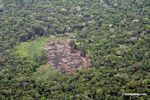
|
|
(06/10/2008) Ecologists and archaeologists agree that when Columbus struck the Americas in 1492 everything changed, but questions persist over the kind of world Columbus and his followers would soon transform. Recently the state of the pre-Columbian Amazon has been under increasing debate among scientists across numerous fields. In a lecture given at the ATBC conference (Association of Tropical Biology and Conservation) in Paramaribo, Suriname, Dr. Francis Mayle weighed in on the debate.
[
Amazon | Ancient civilizations]
Caribbean Monk Seal is officially declared extinct
(06/10/2008) The NOAA fish service has officially declared the Caribbean Monk Seal extinct. The seal--the first to go extinct by human causes--has not had a confirmed sighting for fifty-six year. Many scientists believe sightings that have followed the last confirmation were probably of Hooded Seals and not the Caribbean Monk.
[
Extinction]
Quick biological surveys are facilitating conservation efforts
(06/10/2008) Short but intense biological surveys in remote parts of the world are playing a critical role in determining conservation priorities and disseminating information to policy makers and stakeholders, said researchers speaking in a series of presentations at a scientific conference held in Paramaribo, Suriname.
[
Biodiversity | Conservation]
Rare golden primates help speed recovery of endangered Brazilian forest
(06/09/2008) The endangered golden lion tamarin — a flagship species for conservation efforts in Brazil's highly threatened Atlantic Forest or Mata Atlantica — plays an important role in seed dispersal, thereby helping forest regeneration, according to research published in the June issue of the open access e-journal Tropical Conservation Science.
[
Atlantic forest | Primates | Conservation | Brazil]
Biodiversity data gap impedes research and conservation efforts
(06/09/2008) Biodiversity loss is occurring at an alarming rate around the world. Species are found in the greatest numbers in the tropics and as these areas are impacted by an increasing intensity of human pressure, the status of animal and plant life within them is in many cases in severe decline. International legislation, such as the 2010 Target of the Convention on Biological Diversity, requires countries to measure trends in biodiversity, and also monitor progress towards lowering the rate of biodiversity loss.
[
Biodiversity | Conservation]
Dung beetles persist in long-term forest fragments but may suffer from hunting of large animals
(06/09/2008) Dung beetles bury animal dung to use as their own food and to provide food for their young. This group of beetles is especially prevalent in tropical rainforests. Their burying behavior incidentally contributes to ecosystem functioning and health by the removal of waste, control of dung-breeding pests, soil fertilization and aeration, and the secondary burial of intact seeds found in mammal feces. Because of their important roles in ecosystems, it is important to know how they are affected by habitat change, in this case, habitat fragmentation.
[
Biodiversity | Conservation]
Mexican canyon serves as key refuge for endangered spider monkeys
(06/09/2008) A picturesque canyon in Chiapas, Mexico is serving as an important refuge for the northernmost population of Spider monkeys, reports a study published in the June issue of Tropical Conservation Science.
[
Primates | Conservation | Mexico]
Tropical dry evergreen forests in India protected by religious and cultural beliefs
(06/09/2008) Tropical dry evergreen forest has restricted global distribution — limited to parts of Asia (on the Coromandel coast of India, northern Sri Lanka, Vietnam, Thailand), Africa and Central America — but is highly variable in terms of height and the species it contains, depending on site location, soil type and the level of human impacts. A new study, published in the June issue of Tropical Conservation Science by N. Parthasarathy and colleagues, looks at tropical dry evergreen forest on the Coromandel coast of India where the ecosystem occurs both in patches and as sacred groves or temple forests protected by the local people on religious grounds.
[
India | Conservation]
Argentina's primates under threat from agriculture
(06/09/2008) Five species of non-human primates inhabit in northern Argentina: black and gold howlers, brown howlers, black capuchins, brown-capped capuchins, and owl monkeys. Although two of these species are clearly endangered (brown howlers and owl monkeys), populations of all other species are disappearing due to anthropogenic changes of their habitats. Most of the forests where these species inhabit are under continuous alteration and degradation due to soy, rice, and forest plantations, and exotic pastures for livestock. Moreover, protected forests in Argentina are insufficient to protect these primates.
[
Primates | Conservation]
Rainforest species particularly vulnerable to global warming
(06/08/2008) Tropical species may be particularly vulnerable to global warming due to their limited ability to adjust to high temperatures, warn scientists writing in the journal Science.
[
Biodiversity | Impact of climate change | Extinction]
Brazil creates 3 Amazon parks
(06/08/2008) In a World Environment Day announcement, Brazilian President Luiz Inacio Lula da Silva unveiled three new protected areas covering 6.4 million acres (2.6 million hectares) of Amazon rainforest but warned foreigners to stay out of environmental affairs in the region, according to the Associated Press (AP) and Reuters. [
Amazon | Brazil | Protected areas]
$45 trillion needed to meet energy demand, fight global warming by 2050
(06/08/2008) Investors will need to spend $45 trillion by 2050 to keep pace with growing energy demand while addressing concerns over global warming, warned the International Energy Agency in a report issued Friday. [
Energy]
Despite loss in Congress, global warming lobby gains momentum say environmentalists
(06/08/2008) Friday's defeat of the Lieberman-Warner Climate Security Act (S. 3036) by the Senate is being painted by environmentalists as a step towards future legislative success. [
United States]
Amazon beef producer creates eco-certified meat product with help of scientists
(06/05/2008) Independencia Alimentos SA, Brazil's fifth-largest beef producer, will create an "eco-certified", branded beef product from the Amazon's Xingu region. Certification will be based on criteria established by Aliana da Terra, an Brazilian NGO that seeks to improve the environmental performance of ranchers and beef producers in the world's largest rainforest. The new beef product will include a per-kilo "ecosystem service fee" — calculated with the help of scientists at the Woods Hole Research Center — to facilitate a financial reward for the producer's environmental stewardship.
[
Amazon | Brazil | Certification]
Big Farms Can Make the Leap to Organic Farming, Study Suggests
(06/04/2008) Large fruit and vegetable growers can adopt the methods of small-scale organic farms while maintaining crop yields, keeping pests in check, and improving the health of their soil, researchers report in the July 2008 issue of Agriculture, Ecosystems and Environment.
[
Organic farming]
Brazil's new environmental minister blames ranchers for surge in Amazon deforestation
(06/03/2008) Deforestation in the Brazilian Amazon rose significantly in April 2008 according to Carlos Minc, Brazil's newly appointed environment minister.
[
Amazon]
Diversity in streams may brace Chinook salmon for climate change
(06/03/2008) Chinook salmon face a one-two punch. They have disappeared from several rivers in the western U.S. largely because of human interventions and some populations are threatened or endangered. Numbers of Chinook in California's Central Valley have dwindled by 88 percent in the past five years, a loss that closed fisheries for 2008 and may cost California's economy $167 million, according to the state Department of Fish and Game. On top of all this looms a second impact: These salmon will be in hotter water still because of climate change.
[
Fish]
Cellulosic biofuels may be viable alternative to gas within 5 years
(06/02/2008) A new institute in the San Francisco Bay Area is seeking to make cellulosic biofuel an economically viable alternative to corn ethanol and gasoline within the next five years. The Joint BioEnergy Institute (JBEI), a partnership between three national laboratories and three Bay Area universities, was formed in June 2007 after the U.S. Department of Energy awarded the institute a $125 million grant to develop better methods for making liquid biofuels from the natural cellulose in trees and grasses. JBEI researchers expect cellulosic biofuels to yield more energy, produce less greenhouse gases, and have less impact on the environment than other alternatives to gasoline, such as corn ethanol.
[
Biofuels]
Papua New Guinea's rainforests disappearing faster than thought
(06/02/2008) Logging is taking a heavy toll on the forests of Papua New Guinea, suggests a new study. Using satellite images to reveal changes in forest cover between 1972 and 2002, researchers from the University of Papua New Guinea and the Australian National University found that Papua New Guinea (PNG) lost more than 5 million hectares of forest over the past three decades — total forest cover declined from 38 million hectares in 1972 to 33 million hectares in 2002. Worse, deforestation rates may be accelerating, with the pace of forest clearing reaching 362,000 hectares (895,000 acres) per year in 2001. The study warns that at current rates 53 percent of the country's forests could be lost or seriously degraded by 2021.
[
New Guinea]
Food miles are less important to environment than food choices, study concludes
(06/02/2008) Shoppers concerned about the environment should not place "buying local" at the top of their list of priorities when purchasing food, according to a study published online on April 16 in the journal Environmental Science & Technology. The fuel burned in transporting food items from farm to marketplace creates just a small percentage of the total greenhouse gas emissions associated with the food. Instead, consumers should shift their diets to include more foods that require less energy to produce in the first place.
[
Sustainability]



